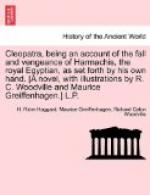“She swore she loved thee!” answered Charmion, lifting her dark eyes: “now I will show thee how she loves thee. Knowest thou what was this house? It was a priest’s college; and, as thou wottest, Harmachis, priests have their ways. This little room aforetime was the room of the Head Priest, and the chamber that is beyond and below was the gathering-place of the other priests. The old slave who keeps the house told me all this, and also she revealed what I shall show thee. Now, Harmachis, be silent as the dead, and follow me!”
She blew out the lamp, and by the little light that crept through the shuttered casement led me by the hand to the far corner of the room. Here she pressed upon the wall, and a door opened in its thickness. We entered, and she closed the spring. Now we were in a little chamber, some five cubits in length by four in breadth; for a faint light struggled into the closet, and also the sound of voices, I knew not whence. Loosing my hand, she crept to the end of the place, and looked steadfastly at the wall; then crept back and, whispering “Silence!” led me forward with her. Then I saw that there were eyeholes in the wall, which pierced it, and were hidden on the farther side by carved work in stone. I looked through the hole that was in front of me, and I saw this: six cubits below was the level of the floor of another chamber, lit with fragrant lamps, and most richly furnished. It was the sleeping-place of Cleopatra, and there, within ten cubits of where we stood, sat Cleopatra on a gilded couch, and by her side sat Antony.
“Tell me,” Cleopatra murmured—for this place was so built that every word spoken in the room below came to the ears of the listener above—“tell me, noble Antony, wast pleased with my poor festival?”
“Ay,” he answered in his deep soldier’s voice, “ay, Egypt, I have made feasts, and been bidden to feasts, but never saw I aught like thine; and I tell thee this, though I am rough of tongue and unskilled in pretty sayings such as women love, thou wast the richest sight of all that splendid board. The red wine was not so red as thy beauteous cheek, the roses smelt not so sweet as the odour of thy hair, and no sapphire there with its changing light was so lovely as thy eyes of ocean blue.”
“What! Praise from Antony! Sweet words from the lips of him whose writings are so harsh! Why, it is praise indeed!”
“Ay,” he went on, “it was a royal feast, though I grieve that thou didst waste that great pearl; and what meant that hour-calling astrologer of thine, with his ill-omened talk of the curse of Menkau-ra?”
A shadow fled across her glowing face. “I know not; he was lately wounded in a brawl, and methinks the blow has crazed him.”
“He seemed not crazed, and there was that about his voice which rings in my ears like some oracle of fate. So wildly, too, he looked upon thee, Egypt, with those piercing eyes of his, like one who loved and yet hated through the love.”




